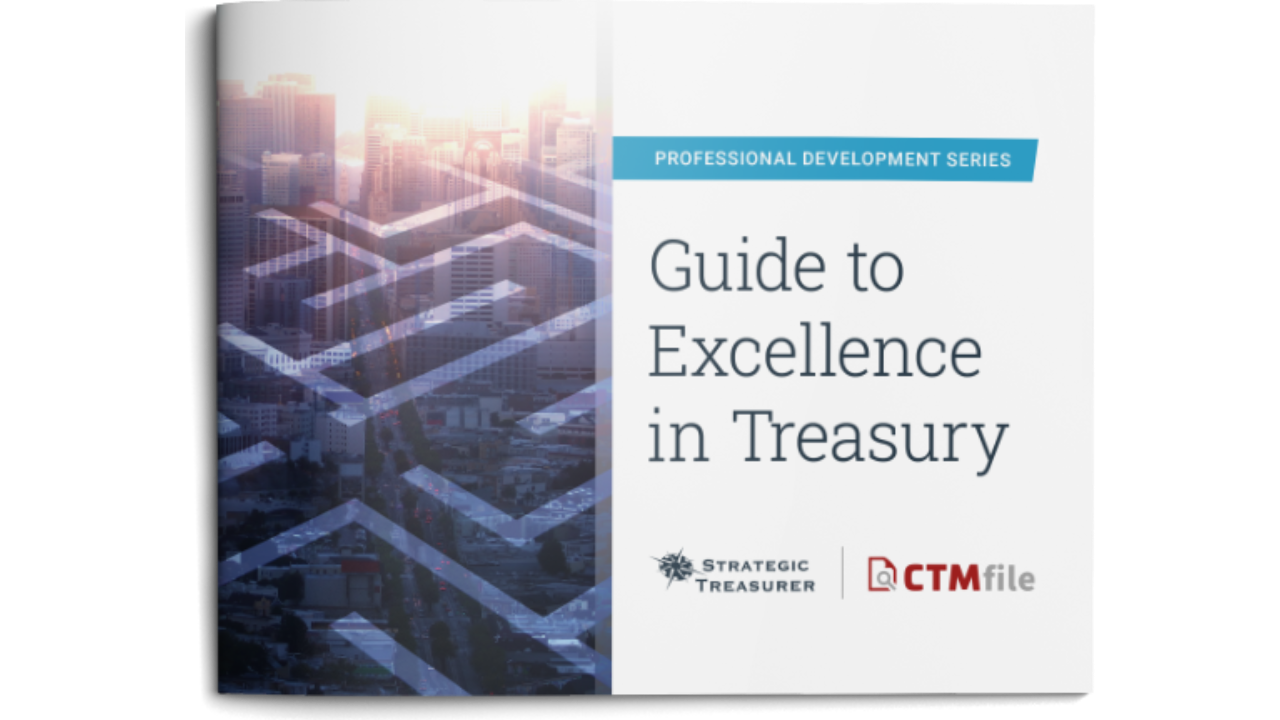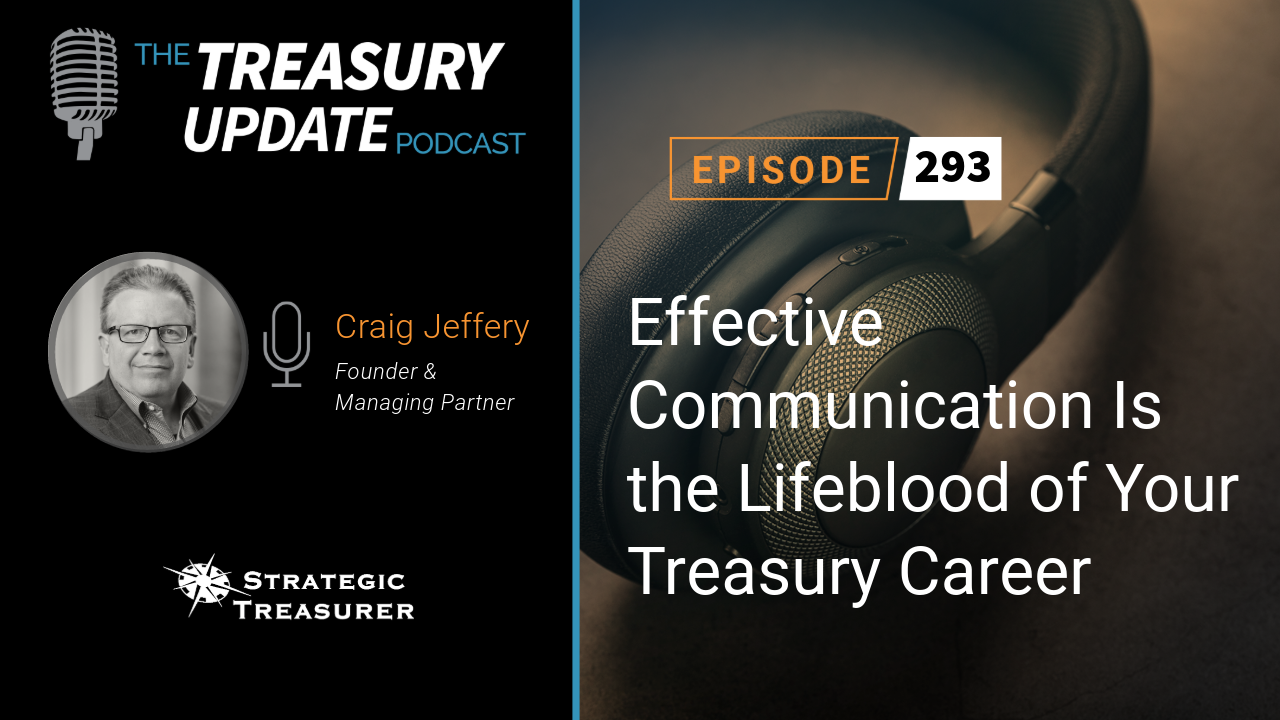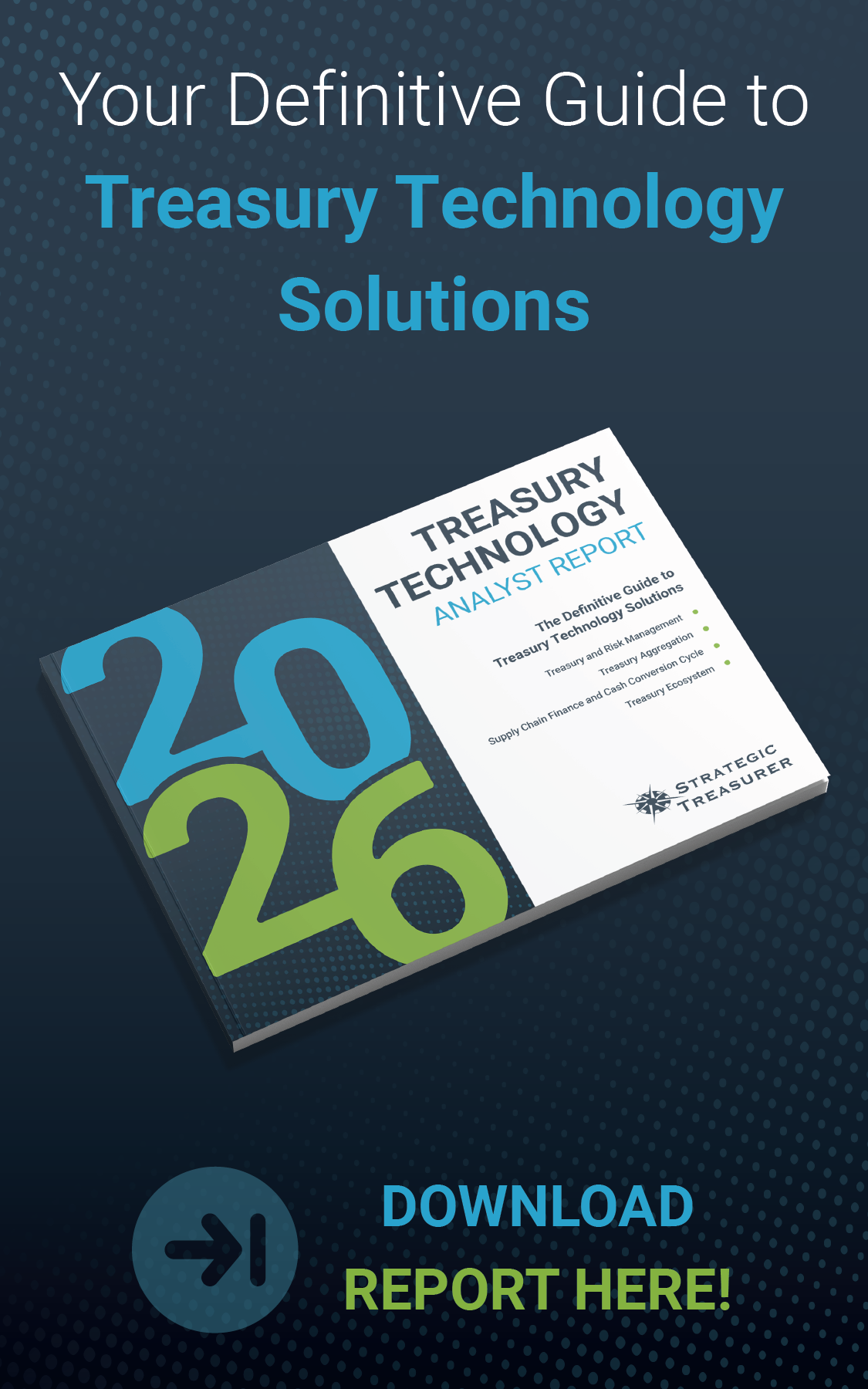
Episode 314
Why Isn’t There a Common Treasury Career Path?
In today’s podcast, Karyn Brown from Austin Industries joins us to share her thoughts on why there isn’t a standard career path for treasurers. Craig Jeffery and Karyn also discuss the varied paths to becoming a treasurer, the implications of this diversity, and the current hiring environment. Listen in to learn more.
Host:
Craig Jeffery, Strategic Treasurer


Speaker:
Karyn Brown, Austin Industries


Subscribe to the Treasury Update Podcast on your favorite app!
Episode Transcription - Episode # 314: Why Isn’t There a Common Treasury Career Path?
Announcer 00:04
Welcome to the Treasury Update Podcast presented by Strategic Treasurer. Your source for interesting treasury news, analysis, and insights in your car, at the gym, or wherever you decide to tune in.
Craig Jeffery 00:18
Welcome to the Treasury Update Podcast. This is Craig Jeffery. I’m your host today. I’m joined by Karyn Brown from Austin Industries. Our episode is called “Why Isn’t There a Common Treasury Career Path”? We’re going to talk through how so often people that get into treasury don’t start off on a career path or having a degree in treasury, and they have a varied path to getting there, and we’ll also discuss some ways that people can get involved in the in the industry, and how we might be able to change that. And so I’m so glad to have you here, Karyn.
Karyn Brown 00:54
Thanks for having me.
Craig Jeffery 00:55
I enjoyed our prep call and some more other conversations over time, but as I said in the intro, there’s a lot of different paths to the role of treasurer compared to many other finance areas, the path is more varied than than others, much more so than you know, let’s say accounting or the controllership. You’ve taken a path from construction safety to treasurer. And I guess the question I have is, why is it that if you ask 50 different treasurers about their career path, you might get 49 or 50 different answers?
Karyn Brown 01:30
It’s true. I’m always amazed when I go to an AFP event and talk to people of how they got into treasury. There’s just not degree paths out there for treasury. And if, and I know, when I was studying in college, if they mentioned treasury, they might have mentioned it for one day in class. And I knew, I do know, that some of the universities have started to offer degree paths in treasury, but not too many the universities are pointing people in the in the direction of accounting and maybe finance, but certainly not in in the area of Treasury. And it’s it’s really unfortunate, because certainly, if you study for the CTP or the FP&A, there’s definitely enough material to put a degree program together. In my case, yes, I came out of construction safety, but I had done so many other things before. I just never found my passion. That day that the Assistant Treasurer tapped me on the shoulder and said, Hey, we need a cash backup. And I looked at her and I said, I have no idea what that is. What’s a cash backup, but I’m willing to do it. I found out that treasury was not only a career, but it was a career that was a lot of fun, and it finally, after being in so many different areas for 20, 25, years, at that point, I made this huge career pivot and found something that I was really good at and I enjoyed, and I wish they had told me about it when I was in college.
Craig Jeffery 03:09
You know, there’s the charter financial analyst, there’s the certified treasury professional. There’s some of these other professional designations that handle the specialty more. Do you think that this, let’s say, lack of a degree program creates a lack or a gap in this area. Is this an issue? Is this an issue that needs to be solved now?
Karyn Brown 03:31
In my opinion, yes. As I said, there’s so many things that they could put a degree program together and help the corporations of America get people focused on treasury, because more and more treasury is becoming really important to the board. I mean, cash forecasting is essential these these days. You know, the pandemic really showed our worth, and we became front and center, and cash was all of a sudden, talked about a lot. A lot of companies finally went, Oh, we do need treasury. So it’s really hard to find people that understand that treasury is different than accounting. It’s different than your traditional finance roles, and understand the the subtle difference of what those are. So even when you’re talking to the the young adults that are looking for internships, the idea of offering an internship in treasury, the deer in the headlight look is what I see, because they’re they don’t even know what treasury is. So you you talk to them about the idea of coming and spending 12 weeks learning treasury, and in their mind, they can’t see where they can apply that later in their career path. I think that’s unfortunate, not only for us as an industry, but for corporates and for them as well.
Craig Jeffery 05:06
There’s a couple things that went through my head. One was, I would like to hear how things are on the job front the hiring situation. There tends to be a gap and how much of this is from feeding the system? I guess the other thing too to comment on is treasury groups tend to be small, very small, very thinly staffed, even though they grow slightly year over year. There’s more groups that add someone into treasury than remove someone or it’s, it’s slow growth. It’s 12 to 18% net companies add treasury people. And there’s, there’s armies of accountants. I mean, there’s, you know, companies will hire two fixed asset accountants. There’s just a tiniest issue, whereas treasury might have three or four people. And I guess as we, as we think about how things move forward, there’s a greater sense of some of the automation, some of AI will take away finance jobs, and probably will and change finance jobs, but will probably have a bigger impact in other areas of finance, rather than treasury. We see those in the numbers. You can’t really cut staff positions in treasury because there’s, there’s so little, there’s much work that remains to be done that’s not done, whereas it’s a, it’ll become a, perhaps become a more important role over time, because it’s, it’s not going to be a shrinking area.
Karyn Brown 06:30
True. I can, I can tell you that I have now been here 24 years, and I’ve been in treasury for 23. When I got to move into treasury, it was a half time position, so there was one and a half people in treasury, and today, 23 years later, it’s a three person treasury department. We’ve gone from being almost like about a billion dollar company to a four and a half billion dollar company. So the change in personnel in accounting, I can tell you, has been dramatically different in terms of numbers versus the numbers in treasury. I don’t expect that I’m going to get a fourth treasury person before accounting gets, you know, another person, that’s for sure. So I’m always faced with having to do more with the three headcount that I have, and that’s why I depend heavily on my treasury workstation. I depend heavily on what those providers are going to be able to help me with in terms of what’s coming down the pike with artificial intelligence, with machine learning, with all of those things that I can get the mundane daily tasks. What can I have machine learning do for me so that I can get those value added tasks into the hands of the treasury analysts that I have and keep them engaged and keep them doing value added tasks. So it’s it’s interesting to see what’s happening, but I don’t think companies are seeing treasury as an area where we provide a lot of value. So it’s very hard to go to the well and say, I could use another person and justify another headcount.
Craig Jeffery 08:31
Whether it’s for risk or control of financial processes. Yeah, kind of interesting. On the job situation, the hiring situations. What have you been experiencing when you’re trying to hire treasury positions? What are you seeing there?
Karyn Brown 08:49
It’s so tough. A lot of people are looking for treasury analyst positions. There’s folks that have been in really, really large companies, and in Dallas, we we are blessed with a whole bunch of Fortune 500 companies. Those companies do have very large treasury staffs. And what I’ve found is that you can be in a treasury department and you might have done part of the treasury analyst job, but you’re not exposed to all of the parts of the job, and then you come to a smaller treasury department, and I’m going to show my age here, but we’re like a soups, dessert department. You have to be able to basically do all parts of the job here, because I don’t have I don’t have people that just do ours. I don’t have people that just do exceptions, and you have to be able to know how to not only open the bank account, but get it hooked up to our ERP system and work with the bank to test the checks and test the ACH file. And you need to know how to what a NACHA fileis, and I’m talking, you’ve got to do the whole thing. And so what I’m finding is it’s really hard to find people that have that broad knowledge. And so if I bring in a person that is brand new, off the street, that I that I can train so, like brand new, fresh out of college, that I can teach much like I was taught. I know they’re going to get that training from me, and I’m going to teach them exactly, you know, what a NACHAfile is, how to read it. I’m going to teach them how to open a bank account, how to do all the things, and I’m going to bring them in as an entry level person, bring them through all the steps, get them ready to promote. When I go outside, and try to bring people in that might have one or two years experience, I find I’m still bringing that person in, and they might not have all that experience, I’m still having to go back and train them just as I would a person fresh out of college. So my frustration is I have to pay more for a person that I’m still going to have to train just as hard as a person out of college that isn’t going to have all the knowledge that I’m going to need out of a person that’s doing the treasury analyst job in a smaller treasury department.
Craig Jeffery 11:30
There’s so many hats you wear. The pool of people that do this, do this type of activity with experience is rather small, like you said. So you’re you’ve got a training component there as well. We staff companies. One company, we ended up having to staff their entire treasury group, and also had to help hire our replacements or to fill up the treasury group again. And it was interesting, because it’s, you know, we hire as a consulting firm, we hire pretty much consistently over time, but it is interesting to see how that shifts. And what I mean by it’s interesting is trying to hire people, and if they have a full set of skills that you need, and they can hit the ground running, as we like to say, it always seemed like they wanted, you know, they wanted a million dollars, and it’s like, it’s like, they can’t afford that. And then you find someone else, and it’s like, okay, they have no skills and they’re completely green, or, if they have, you know, multiple years of experience, they’re not really interested in saying, I’m going to step back and learn a new skill and start this new trajectory. It’s a conundrum. It’s a challenge to make that work, and it varies how hard that is at different times. I think we’re in that we’re in an area where it’s a bit of a challenge right now. What, you know, you had mentioned, you know, ways to perhaps alleviate this issue to some extent, like a college degree, maybe there’s and you talked about having people coming for an internship and say, I don’t, I don’t know what treasury is. Why would I do that? I think it’s Northern Illinois University has a program in treasury. They have a bunch of their students that are ready to graduate or juniors. They participate in the Windy City conference, and they introduce people, and so they get some they get some experience there, but I don’t think there’s a lot of universities that have a program like that. What do you think can be done about this gap?
Karyn Brown 13:27
Gosh, there’s so many things that come to mind, but corporate America has to be open to looking at internships for treasury. The universities have to be open to offering the degree program. You know, at that point, it’s all about the dollars. But there’s also, there’s an education component too, because what makes people want to be accountants? What makes people want to be lawyers? You know, I don’t see, you know anybody out there breaking down the doors going, you want to be a treasurer. So how do we get the word out to people that are just starting out thinking about what they want to do in life, about this career path? That’s the question. I mean, everybody’s heard of being an accountant and all these other popular degree programs, but it’s a great question, but it’s probably bigger than you and I can tackle in this podcast. But you know, certainly internships are an interesting idea. I know I’m a group of another professional association that that does a year long mentorship with college students. And I’ve honestly thought about bringing a college student in as a mentor, trying to get a young person to think about the idea of treasury. It’s tough to look at accountants and go, Hey, or accounting students or finance students and and get them to think about the idea of corporate treasury when when they’re not presented with why they should. So maybe we need to convince the professors, or influence the professors in finance land, that that they need to focus on it more, or the curriculum directors.
Craig Jeffery 15:22
So do we have to have a dean or two of the business school on the podcast?
Karyn Brown 15:27
There we go. There we go. I mean, it’s a big issue.
Craig Jeffery 15:32
Do you think that some schools should add it as a full time degree, and other schools add it as you can have a minor in this?
Karyn Brown 15:42
I think there’s a multi pronged approach. And this is, I think there’s room for it in the, gosh, they don’t call them junior colleges anymore, but or community colleges, or around here, they call them colleges. There’s room for a two year associate’s degree in this, or there’s room for a certificate program to get you in the door and wanting to learn about it. There’s, as you said, there’s room for it to be a minor but at least there’s room for a curriculum to include treasury courses, not just mention it, one day as part of an accounting course, or one day as part of a finance course. All you have to do is go through the CTP book and you realize how much curriculum could be based around a, you know, for a college degree in the treasury space.
Craig Jeffery 16:37
So you heard it here first, you should add courses, maybe have minors, maybe you make it as a major. Any deans or heads of business schools, I’d love to talk to you about that at some point. Really good, really good points, Karyn. Karyn, can you give a little bit of background on yourself and Austin Industries? For those who may not know you, or may not know Austin Industries?
Karyn Brown 17:02
That’s excellent. So Austin Industries is headquartered in Texas, but not in Austin, Texas, in Dallas, right? Sure. Yeah, Austin Industries has been around since 1918 we are a 100% employee owned company. We are the 33rd largest builder in the country. I always say we build big things, and if you recently watched the NBA Finals, you saw the American Airlines center where the Mavericks play. We built that. If you’ve ever flown through DFW airport, we built that, or San Francisco Airport. We’re currently building two of the Texas Instrument fabs for the little chips that we use in our phones. We build other, you know, we build highways and bridges and hospitals. So we’re all over the nation. We just finished a whole bunch of consolidated rental car facilities like at Newark Airport, Utah. I can go on and on and on, but that’s our company. We’re really proud that we’re 100% employee owned. It’s it’s a big deal. We just had our employee owned owner party this week because we, we all got our stock certificates. So it’s a it’s a happy week around this company. I’ve been with the company 24 years, as you’ve already mentioned. I actually came to the company as a construction safety and had the opportunity to move to the finance group because my project was ending. And when a project ends, before you get assigned to a new project, you find a place to call home for the couple of weeks or a couple of months before you get assigned a new project. And that was the fortunate time when Brenda Shirts had the opportunity to tap me on the shoulder and ask me to be a cash backup. And in this case, it became my new career. From that I went ahead and studied for the CTP, and I joined the Dallas AFP and the AFP, and I just, ever since then, have been extremely involved with both organizations. And then down here in Texas, we have a little thing called Texpo. It’s much like the Windy City, but I became the education chair for Texpo 2012 and 2018 and then I was the co-chair for Texpo 2023. That’s correct, and that’s because our our history is that we started out as the Austin Brothers Company, and then when our founder bought the company away from the Austin Brothers, they it was Charles Moore who bought the company originally, and they were located in Dallas. Yes, but we, we started out as the Austin Brothers Company.
Craig Jeffery 20:04
Yeah, your involvement in the industry. So the Dallas AFP, Texpo. Now Texpo, I remember back when Texpo is probably about the fourth largest regional AFP. I think now, by count, they’re probably the largest AFP. This consistent growth over time. So what do you do there? And any additional shout outs to Texpo or Dallas AFP?
Karyn Brown 20:30
Well, next year’s Texpo will be down in San Antonio, so I will just happily be an attendee. But for Dallas AFP, I have, I’ve held a number of different offices, but I am, I am gladly, just an attendee at this point, because, you know, after serving 12 years on the board, I looked to everybody and said, It’s time for other people to learn how to be on the board. And I, I will support you 100% but for right now, I’m going to focus on my career, and I’m going to travel with my husband, and I will happily attend. So I think 12 years on the board is enough.
Craig Jeffery 21:09
It sounds like a good round number. There’s generations that are more into volunteering, and then let’s say the current age cohort. There’s the phrase giving back. Why should someone be involved in their regional or local AFP?
Karyn Brown 21:28
My former boss, Brenda Shirts, who’s now retired, said that she noticed a huge difference in my career path when I started volunteering, and I started getting more leadership positions within Dallas AFP. And not only that, but when you volunteer and you start to build those relationships in those organizations, you have people to reach out to, to be a resource. And I’ll give you an example. I recently, our company recently started hedging. And of course, you know, I had to learn about hedging when I studied for the CTP. But of course, that was a long time ago. It was basic knowledge. But it’s a lot different when you are putting your signature on an ISDA for the company, and all of a sudden it’s real and those are real dollars. So I reached out to a colleague within Dallas AFP that has been doing hedging a lot for a long time, and he was able to sit down with me and really go over what the ISDA was and what the swaps were, and what it meant when I was going to place an order, and and all the different things. And it’s, it’s so nice to have those colleagues that you can reach out to when, when you’re faced with something that you’re going to be doing that’s brand new, and you’ve got a friend that you can call. Other people call me all the time too. You know, they’re faced with, Hey, we’re going to order a new service. Don’t you use this service? You know? What do you think about it? What pitfalls did you run into? What can you help us avoid? So those relationships that you build are golden because it will help you in your career, and it’ll help your company, hopefully, to not run into the same mistakes. You’ll get your implementations done a lot quicker if you can avoid those mistakes.
Craig Jeffery 23:32
So your first hedge, was it interest rate, foreign exchange, commodity?
Karyn Brown 23:37
Diesel. Diesel fuel.
Craig Jeffery 23:39
Diesel. Okay, I won’t ask you about, did you get hedge accounting treatment or not? But I did want to shift over from this getting involved in the industry, over to, you know, any final discussion areas that you wanted to cover, or any key takeaways, like, if you had someone else who’s starting their career off, what would be the top elements of advice that you would give them?
Karyn Brown 24:01
Always be willing to learn something new, even if it’s outside your job description. And stay curious. Don’t just go through the motions in your job. If you see something that’s just not it just doesn’t feel right, doesn’t look right, stay curious and ask questions, because it could be something that’s that isn’t right. Asking that question might save the company from fraud. I know we’ve had a lot of fraud attempts lately and, you know, if you’re curious and stay and stay alert, it can make a huge difference, and that curiosity is what can really make the difference in how you do your job and how you get noticed doing your job, because you want to be noticed doing an excellent job, because that’s how you get tapped on the shoulder for that next promotion.
Craig Jeffery 24:59
Promotion, yeah, the next promotion, the next challenge. So curious, also suspicious in a little bit of way, like being suspicious of issues, right? There’s this intellectual curiosity. I think those are really, really good points. The other jobs that you take on that are outside your job description are those within treasury, within finance, cross departmental? Any, any additional guidance on that?
Karyn Brown 25:28
Over my career path, I can, I can tell you I they have been, they’ve been all of the above I can. I can tell you that I the benefits department came to me and and they were needing help with their 5500s and I went and helped them with their 5500s. That’s, I mean, now I’m talking HR benefits. They were really behind and down a person. And at the time, my boss was VP of HR and treasury, which is a really bizarre, you know, blend of departments. But I had time, and I did it, and I didn’t have a degree in HR, and I didn’t work in HR, but they told me what I needed to do, and I did it. And then internal audit was, was offering the ability to work on an internal audit, just, you know, to see if you might like to go into internal audit, and you could be part of a team. And I took the opportunity to go work on an internal audit one time, which was a lot of fun, and I learned exactly the steps of what they have to do when they’re going through an internal audit. And that was a lot of fun. I learned that I really don’t want to do that, but it was a lot of fun, and I learned all the steps they have to do, but then the accounting department was really behind on the reconciliations, and they needed help, and I was able to jump in and help them with the reconciliations. I’m always willing to help out if I have the time. Over the path of my career, I’ve learned that that willingness has always done wonderful things for me because they come to me with problems I’m able to help. Those are the things that get referenced when there’s an opportunity for me to excel in other places or get promoted, or whatever it is. 23 years ago, I didn’t know treasury existed, and I’m sitting here. It was during the pandemic in 2020 when the CFO called me and said, we’re promoting you to treasurer. I chalk that up to my willingness to do what it takes, no matter which department it was in.
Craig Jeffery 27:50
Excellent. Those some really good, good key takeaways. One final question is, what if that opportunity comes up to do some work in construction safety. Are you going to?
Karyn Brown 28:05
I miss being on construction projects. They are so fun. When I do get an opportunity to go out on the projects, just to tour them, I’m like a kid in a candy store. It’s a lot of fun to go out there.
Craig Jeffery 28:18
That’s excellent. Karyn, thanks so much for your time.
Karyn Brown 28:21
Of course, thank you. I really appreciate it.
Announcer 28:26
You’ve reached the end of another episode of the Treasury Update Podcast. Be sure to follow Strategic Treasurer on LinkedIn. Just search for Strategic Treasurer. This podcast is provided for informational purposes only, and statements made by Strategic Treasurer LLC on this podcast are not intended as legal, business, consulting, or tax advice. For more information, visit and bookmark StrategicTreasurer.com.
Related Resources
Guide to Excellence in Treasury
Whether you’re aiming to become a treasurer, have just landed the job, or have held the position for years but are still seeking ways to improve and grow, this guidebook should have some ideas that will help you and your organization thrive.
Effective Communication Is the Lifeblood of Your Treasury Career
In today’s discussion, we’ll hear from Craig Jeffery, Managing Partner of Strategic Treasurer, on just one of the topics covered in the Guide to Excellence in Treasury: effective communication. He talks through action items, a real-world example from his past, and how communication will change with the implementation of generative AI.







